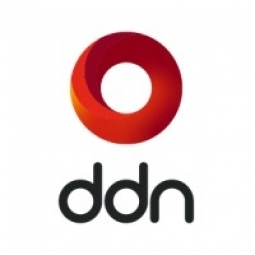ACCELERATE: LIFE SCIENCES - Children’s Mercy Kansas City Reduces Time to Achieve Major Medical Breakthroughs for Critically Ill Children by Nearly 2x with Rapid Genome Sequencing Powered by High-Performance DDN Storage

Company Size
1,000+
Region
- America
Country
- United States
Product
- DDN GS7K®
Tech Stack
- High-Performance Computing
- Genomic Sequencing
- Data Storage
Implementation Scale
- Enterprise-wide Deployment
Impact Metrics
- Innovation Output
- Productivity Improvements
Technology Category
- Infrastructure as a Service (IaaS) - Cloud Storage Services
Applicable Industries
- Healthcare & Hospitals
Applicable Functions
- Product Research & Development
Use Cases
- Condition Monitoring
- Predictive Maintenance
Services
- Data Science Services
About The Customer
Children’s Mercy Kansas City is a leading children’s hospital that operates the world’s first whole genome sequencing center in a pediatric setting. At the hospital’s Center for Pediatric Genomic Medicine, physicians collaborate with clinical laboratory scientists, molecular geneticists, bioinformaticians and software engineers to sequence and analyze rare inherited diseases. In 2012, Time magazine named the Center’s rapid genome mapping test, STAT-Seq, a top medical breakthrough of the year for decoding a genome from start to finish in about two days—a process that traditionally takes six weeks or longer. The Center is focused on developing clinical tests for next-generation medical treatments to improve outcomes for patients at Children’s Mercy and around the world.
The Challenge
Children’s Mercy Kansas City, a leading children’s hospital, operates the world’s first whole genome sequencing center in a pediatric setting. The hospital’s Center for Pediatric Genomic Medicine collaborates with various professionals to sequence and analyze rare inherited diseases. However, genetic sequencing is very compute- and data-intensive, which puts ever-increasing pressure on the Center’s IT team to deliver ample processing power and highly capable data storage to support testing based on both whole genome sequencing and whole exome sequencing. The Center had previously deployed EMC Isilon storage, which initially met their storage requirement for handling both clinical and research workflows. Over time, however, Children’s Mercy’s traditional scale-out NAS storage lacked the scalability in performance and capacity to address demanding data creation and access needs.
The Solution
Children’s Mercy deployed the DDN GS7K® with 1PB of scale-out storage to meet performance, parallel I/O and capacity requirements. DDN’s GRIDScaler® platform, which integrates the industry’s leading performance and density storage with IBM® Spectrum Scale™-based parallel file system, was ideal for supporting the Center’s full range of clinical and research workflows. DDN delivered the complete end to end data management of the high performance and collaboration environment seamlessly. DDN’s GS7K also provided Children’s Mercy with the ideal form factor, delivering high-density storage within its small data center footprint, and the ability to scale capacity in a simple fashion. The Center also is exploring opportunities to expand its DDN storage to reinforce its leadership in pediatric translational research.
Operational Impact
Quantitative Benefit

Case Study missing?
Start adding your own!
Register with your work email and create a new case study profile for your business.
Related Case Studies.

Case Study
Hospital Inventory Management
The hospital supply chain team is responsible for ensuring that the right medical supplies are readily available to clinicians when and where needed, and to do so in the most efficient manner possible. However, many of the systems and processes in use at the cancer center for supply chain management were not best suited to support these goals. Barcoding technology, a commonly used method for inventory management of medical supplies, is labor intensive, time consuming, does not provide real-time visibility into inventory levels and can be prone to error. Consequently, the lack of accurate and real-time visibility into inventory levels across multiple supply rooms in multiple hospital facilities creates additional inefficiency in the system causing over-ordering, hoarding, and wasted supplies. Other sources of waste and cost were also identified as candidates for improvement. Existing systems and processes did not provide adequate security for high-cost inventory within the hospital, which was another driver of cost. A lack of visibility into expiration dates for supplies resulted in supplies being wasted due to past expiry dates. Storage of supplies was also a key consideration given the location of the cancer center’s facilities in a dense urban setting, where space is always at a premium. In order to address the challenges outlined above, the hospital sought a solution that would provide real-time inventory information with high levels of accuracy, reduce the level of manual effort required and enable data driven decision making to ensure that the right supplies were readily available to clinicians in the right location at the right time.

Case Study
Gas Pipeline Monitoring System for Hospitals
This system integrator focuses on providing centralized gas pipeline monitoring systems for hospitals. The service they provide makes it possible for hospitals to reduce both maintenance and labor costs. Since hospitals may not have an existing network suitable for this type of system, GPRS communication provides an easy and ready-to-use solution for remote, distributed monitoring systems System Requirements - GPRS communication - Seamless connection with SCADA software - Simple, front-end control capability - Expandable I/O channels - Combine AI, DI, and DO channels

Case Study
Driving Digital Transformations for Vitro Diagnostic Medical Devices
Diagnostic devices play a vital role in helping to improve healthcare delivery. In fact, an estimated 60 percent of the world’s medical decisions are made with support from in vitrodiagnostics (IVD) solutions, such as those provided by Roche Diagnostics, an industry leader. As the demand for medical diagnostic services grows rapidly in hospitals and clinics across China, so does the market for IVD solutions. In addition, the typically high cost of these diagnostic devices means that comprehensive post-sales services are needed. Wanteed to improve three portions of thr IVD:1. Remotely monitor and manage IVD devices as fixed assets.2. Optimizing device availability with predictive maintenance.3. Recommending the best IVD solution for a customer’s needs.

Case Study
HaemoCloud Global Blood Management System
1) Deliver a connected digital product system to protect and increase the differentiated value of Haemonetics blood and plasma solutions. 2) Improve patient outcomes by increasing the efficiency of blood supply flows. 3) Navigate and satisfy a complex web of global regulatory compliance requirements. 4) Reduce costly and labor-intensive maintenance procedures.

Case Study
Harnessing real-time data to give a holistic picture of patient health
Every day, vast quantities of data are collected about patients as they pass through health service organizations—from operational data such as treatment history and medications to physiological data captured by medical devices. The insights hidden within this treasure trove of data can be used to support more personalized treatments, more accurate diagnosis and more advanced preparative care. But since the information is generated faster than most organizations can consume it, unlocking the power of this big data can be a struggle. This type of predictive approach not only improves patient care—it also helps to reduce costs, because in the healthcare industry, prevention is almost always more cost-effective than treatment. However, collecting, analyzing and presenting these data-streams in a way that clinicians can easily understand can pose a significant technical challenge.



